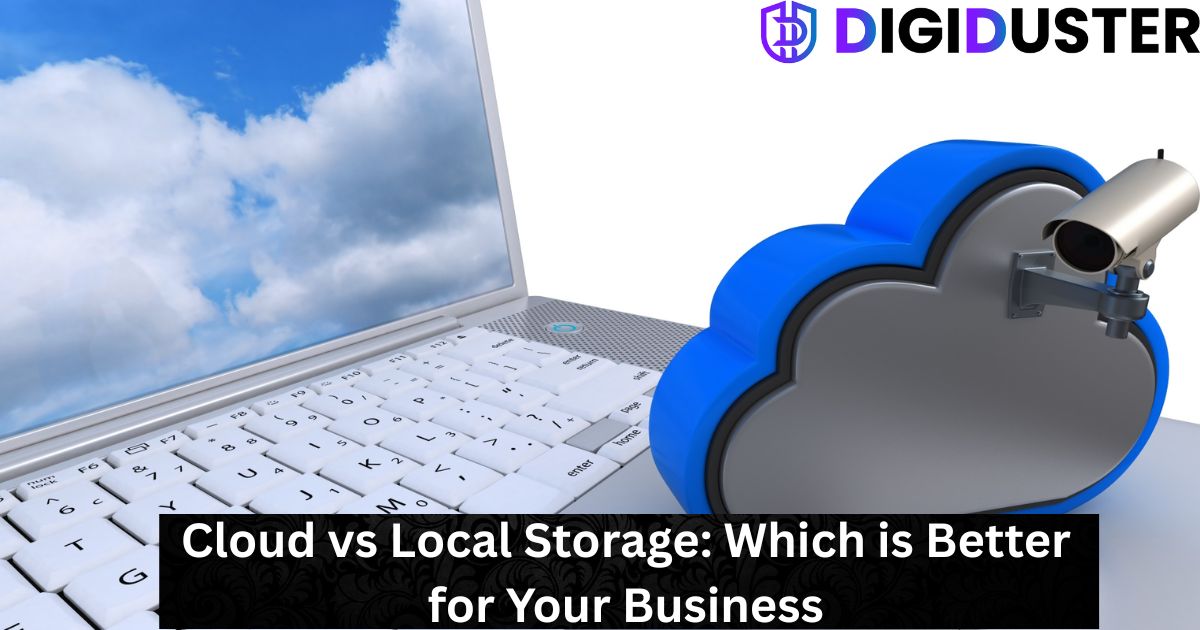Running a business today means dealing with lots of files, documents, photos, and data. Whether you’re a freelancer starting out, a stay-at-home parent building an online business, or a small business owner growing your team, you need a safe place to store all your important business files. But here’s the big question: Should you keep everything on your computer (local storage) or store it online (cloud storage)? This choice can make or break your business success. Cloud vs local storage isn’t just a tech decision – it’s a business decision that affects your money, time, and peace of mind.
In this guide, we’ll break down everything you need to know about cloud storage vs local storage in simple terms that anyone can understand.
What is Local Storage? (The Old-School Way)
Local storage means keeping your files on devices you can touch – like your laptop, desktop computer, or external hard drives. Think of it like having a filing cabinet in your office. Everything is right there with you.
Examples of local storage:
- Your computer’s hard drive
- USB flash drives
- External hard drives
- CDs and DVDs (though these are pretty old now!)
How Local Storage Works for Different Businesses
For Digital Marketing Agencies: You might store client logos, campaign images, and reports on your computer or external drives.
For Content Writers: All your articles, client work, and research files sit on your laptop.
For Graphic Designers: Those big design files and client projects take up space on your computer’s memory.
What is Cloud Storage? (The Modern Way)
Cloud storage means keeping your files on someone else’s computers (called servers) that you access through the internet. It’s like having a magical filing cabinet that you can open from anywhere in the world.
Popular cloud storage services:
- Google Drive
- Dropbox
- Microsoft OneDrive
- Apple iCloud
- Amazon Web Services (AWS)
How Cloud Storage Helps Different Industries
For Virtual Assistants: Access client files from anywhere, whether you’re working from home or traveling.
For E-learning Creators: Store video courses and materials that students can access 24/7.
For Event Planners: Share vendor contracts and planning documents with team members instantly.
Top 10 Networking Certifications That Can Double Your Income in 2025
The Big Differences Between Cloud and Local Storage
Let’s break down the difference between local and cloud storage in ways that matter to your business:
1. Cost Comparison
Local Storage Costs:
- One-time purchase (usually $50-$500 for hard drives)
- No monthly fees
- But you need backups (more devices to buy)
Cloud Storage Costs:
- Monthly or yearly subscription ($5-$50+ per month)
- Ongoing expense
- But includes automatic backups
Real Example: Sarah runs a small accounting firm. She spent $200 on external hard drives last year, but lost client files when one drive crashed. Now she pays $12/month for cloud storage and hasn’t lost a single file in two years. That peace of mind is worth way more than the monthly cost.
2. Security: Cloud Storage vs Local Storage Security
This is where many business owners get confused. Let’s clear it up:
Local Storage Security:
- You control everything
- But if your computer gets stolen or crashes, files are gone
- No protection from fires, floods, or other disasters
- You’re responsible for all security measures
Cloud Storage Security:
- Professional security teams protect your data 24/7
- Multiple backup copies in different locations
- If your laptop breaks, files are still safe online
- Advanced encryption (fancy word for “super-secret coding”)
Statistic Alert: According to recent studies, 60% of small businesses that lose their data shut down within 6 months. Cloud storage providers like Google and Microsoft have 99.9% uptime, meaning your files are almost always available.
3. Accessibility and Teamwork
Local Storage Access:
- Only works on the device where files are stored
- Hard to share with team members
- Can’t access files when traveling
Cloud Storage Access:
- Work from anywhere with internet
- Easy file sharing with team members or clients
- Perfect for remote work and digital nomads
Case Study: Mike runs a web design agency with designers in three different states. Before cloud storage, they emailed files back and forth, creating confusion and version problems. Now, everyone works on the same files in real-time through cloud storage. Project completion time improved by 40%.
Top 20 Profitable Outdoor Adventure Business Ideas You Can Start Today
Why is Cloud Storage Better Than Local Storage for Most Businesses?
Here are the top reasons why cloud storage is better than local storage for modern businesses:
1. Automatic Backups Save Your Business
With local storage, you have to remember to back up your files. With cloud storage, it happens automatically. Every change you make gets saved instantly.
2. Scale Up As You Grow
Starting businesses often begin small but grow quickly. Cloud storage grows with you:
- Start with 15GB free (Google Drive)
- Upgrade to 100GB for $2/month
- Scale up to unlimited storage as needed
3. Perfect for Remote Work
The pandemic taught us that remote work is here to stay. Working professionals seeking side hustles and digital nomads need access to files from anywhere. Cloud storage makes this possible.
4. Collaboration Made Easy
Multiple people can work on the same document simultaneously. This is perfect for:
- Content writing teams editing articles together
- Event planners coordinating with vendors
- Virtual assistants sharing progress with clients
When Local Storage Still Makes Sense
While we’re big fans of cloud storage, local storage isn’t completely dead. Here’s when it might work better:
1. Extremely Sensitive Data
Some finance and accounting services deal with highly confidential information that regulations require keeping on-site.
2. Very Large Files
Creative and design professionals working with huge video files might find local storage faster for daily work.
3. Areas with Poor Internet
If your internet connection is unreliable, local storage ensures you can always access your files.
4. One-Time Storage Needs
If you need to store old files that you rarely access, a one-time purchase of an external drive might be cheaper than years of cloud subscriptions.
Top Online Platforms for Business Owners Looking for Partners in the USA
Cloud Storage vs Local Storage: The Hybrid Approach
Smart businesses often use both! Here’s how:
Daily Work: Use cloud storage for active projects and files you access regularly.
Archive Storage: Keep old tax documents and completed projects on local drives.
Critical Backups: Use cloud storage as your main backup, but keep a local backup of your most important files too.
Choosing the Right Solution for Your Industry
For Digital Marketing Agencies
Recommendation: Cloud storage
Why: Easy client collaboration, access from anywhere, automatic backups of campaign materials
For Health and Wellness Professionals
Recommendation: Cloud storage with strong security
Why: HIPAA compliance options available, secure client communication, and access patient files safely
For Education and E-learning
Recommendation: Cloud storage
Why: Easy content distribution, student access, and collaboration with other educators
For Freelancers and Entrepreneurs
Recommendation: Start with the cloud, add local backup later
Why: Low upfront costs, professional appearance, grow as you scale
Getting Started: Your Action Plan
Step 1: Assess Your Current Storage Needs
- How much data do you have now?
- How fast is it growing?
- Who needs access to your files?
Step 2: Choose Your Primary Solution
For most small business owners and aspiring entrepreneurs, we recommend starting with cloud storage:
- Google Workspace ($6/user/month)
- Microsoft 365 ($6/user/month)
- Dropbox Business ($15/user/month)
Step 3: Set Up Your Backup System
Never rely on just one storage method. Use the 3-2-1 rule:
- 3 copies of important data
- 2 different storage types (cloud + local)
- 1 offsite backup (cloud storage counts)
Remote Cybersecurity Jobs in 2025: Where to Find Them & How to Qualify
Step 4: Train Your Team
Make sure everyone knows:
- How to access files
- How to share documents safely
- What files go where
Common Mistakes to Avoid
Mistake #1: Not Having Any Backup Plan
75% of small businesses have no data backup plan. Don’t be part of this statistic!
Mistake #2: Choosing Based Only on Price
The cheapest option might cost you everything if you lose important data.
Mistake #3: Not Testing Your Backup
Set up a test: try to recover a file from your backup system. Make sure it actually works!
Mistake #4: Ignoring Security Settings
Default security settings might not be enough for your business. Take time to set up proper permissions.
The Future is Hybrid: Best of Both Worlds
The difference between cloud and local storage is becoming less important as technology improves. The smartest approach combines both:
- Cloud-first strategy: Store active files in the cloud
- Local backup: Keep copies of critical files locally
- Smart automation: Set up systems that handle backups automatically
Real Success Stories
Story 1: The Traveling Consultant
Jennifer runs a business coaching practice and travels frequently. She switched from local storage to cloud storage last year. Now she can:
- Access client files from any location
- Share resources instantly during video calls
- Never worry about forgetting important documents at home
Result: Client satisfaction increased, and she landed 30% more contracts because of her professional, organized approach.
Story 2: The Growing Design Agency
Tom’s graphic design business started as a solo operation but grew to 5 employees. Local storage became impossible when:
- Team members couldn’t access each other’s work
- Version control became a nightmare
- File sharing took too much time
After switching to cloud storage:
- Project turnaround time improved by 50%
- Client revisions became seamless
- Team productivity increased dramatically
Making the Right Choice for Your Business
The cloud vs local storage decision ultimately depends on your specific situation. Here’s a quick decision guide:
Choose Cloud Storage if you:
- Work with a team
- Travel frequently
- Want automatic backups
- Need to access files from multiple devices
- Are growing your business
- Want professional-level security
Choose Local Storage if you:
- Work alone with very sensitive data
- Have unlimited time for manual backups
- Work with extremely large files daily
- Have poor internet connectivity
- Need one-time storage for archives
Choose Hybrid if you:
- Want the best of both worlds
- Handle various types of data
- Need maximum security and convenience
- Can invest in both solutions
Take Action Today
Don’t let data loss destroy your business dreams. Whether you’re a student starting a side hustle, a retired individual exploring new income streams, or a working professional building something bigger, your data protection strategy matters.
Your next steps:
- Audit your current data situation – What files would hurt your business if lost?
- Calculate your storage needs – How much space do you actually need?
- Research providers – Compare features, prices, and security options
- Start with a trial – Most cloud services offer free trials
- Set up your backup system – Don’t wait until it’s too late
Ready to Secure Your Business Future?
The difference between local and cloud storage isn’t just technical – it’s the difference between a business that survives unexpected challenges and one that doesn’t.
At Digiduster.com, we help entrepreneurs and small businesses make smart technology decisions that fuel growth. Our team has helped hundreds of businesses transition to secure, efficient storage solutions that save time and money.
Don’t risk your business on outdated storage methods.
Connect with us today for a free consultation on choosing the right storage strategy for your business.
Contact us to learn how cloud storage can transform your business operations.
Your business data is your most valuable asset. Protect it with the right storage solution, and watch your business thrive with the confidence that comes from knowing your files are safe, accessible, and professional.
Remember: in the cloud vs local storage debate, the winner is the solution that best fits your business needs. But for most modern businesses, cloud storage offers the flexibility, security, and growth potential that local storage simply can’t match.
Start protecting your business today – because success is built on a foundation of secure, accessible data.



